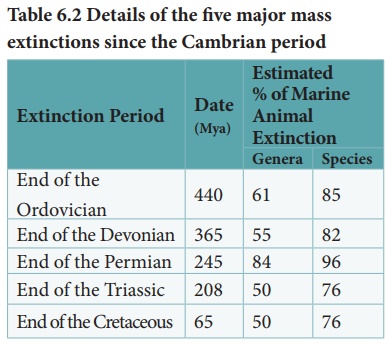Evolution - Extinction of Animals | 12th Zoology : Chapter 6 : Evolution
Chapter: 12th Zoology : Chapter 6 : Evolution
Extinction of Animals
Extinction
of Animals
Extinction
Extinction was common if
not inevitable because species could not always adapt to large or rapid
environmental changes. The impact of extinction can conveniently be considered
at three levels.
Species extinction eliminates an entire species,
by an environmental event (flood etc.,) or by biological event (disease or non
availability of food resource half or more).

Mass extinction eliminates half or more
species in a region or ecosystem, as might occur following a volcanic
eruption. Five major mass extinction that occurred since the Cambrian period.
This mass extinction is often referred to as K-T extinction. Table 6.2
represents the K-T extinction.
K-T Extinction refers to the German
word Cretaceous and Tertiary periods.
Global extinction eliminates most of the species on a large scale or larger taxonomic groups in the continent or the Earth. Snow ball Earth and extinction following elevation in CO2 levels are example. Extinction events opens up new habitats and so can facilitate the radiation of organisms that survived the mass extinction.
Related Topics